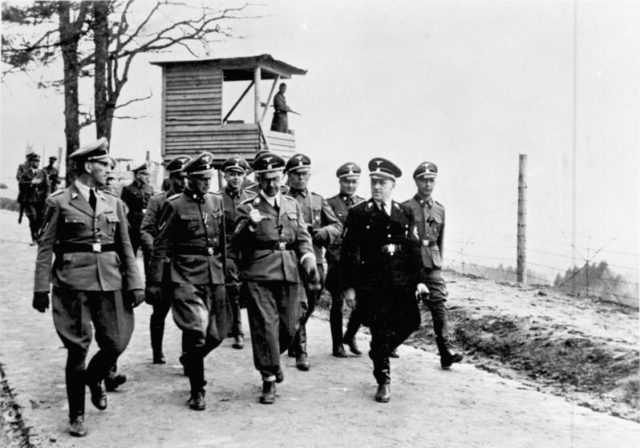The headline may come to a surprise to many. Wasn’t Heinrich Himmler the person behind the SS and the Holocaust? Surely he wasn’t in command of the Eastern Front?! Well if that is what you thought you were mostly right; however, even though Himmler was anything but a general, Hitler made him an Army Group Commander, not once but twice!
He was not to command some backwater either. On January 25th, 1945 Hitler made him the commander of the forces directly responsible for stopping the Russians from reaching Berlin. As can be expected, he was terrible at it, and that helped shorten the war considerably.
In December 1944 Himmler was appointed the commander of the Army Group Upper Rhine. Army Group Upper Rhine was responsible for defending the Rhine in the Alsace-Lorraine area. Hitler appointed Himmler to command the army group in December 1944. The army group launched Operation North Wind in January 1945, the last major German offensive in Western Europe.

It was intended to take the pressure off the retreating divisions from the Battle of the Bulge, but it failed, even though it had limited aims. Himmler had nothing to do with the planning the offensive and almost nothing to do with its execution.
In spite of this failure, Hitler thought Himmler was now ready for the real deal, so in late January 1945, he was appointed the command of Army Group Vistula. This army group was put together from elements of Army Group A (shattered in the Soviet Vistula-Oder Offensive), Army Group Centre (similarly mostly destroyed in the East Prussian Offensive), and a variety of new or ad hoc formations. It was formed to protect Berlin from the Soviet armies advancing from the Vistula River.
It is estimated that over 500,000 soldiers were part of Army Group Vistula. This was no backwater; this was the decisive front where the future of the Reich would be determined.
Himmler established his command on a special train, “the Steiermark,” which he rarely left. The train was parked at Deutsche-Krone and from here he ran his vast personal empire, and when he had time, the Army group entrusted to him. The train had only one telephone line, no signal detachment or radios, and inadequate maps. As a result, orders from his command rarely made their way to the front. He was never seen at the front. He appointed his personal masseuse, Felix Kersten, to his staff and insisted on daily massages followed by long naps. He only worked four hours a day and did not work very hard during those four hours. Himmler was unable to devise any viable plans for completion of his military objectives.

In February of 1945, General Heinz Guderian had devised a counteroffensive called “Operation Solstice.” The aim of the operation was to use Army Group Vistula to drive back the Soviets with a massive counterattack. General Guderian, knowing that a full-fledged assault led by Himmler would be a bloody disaster, demanded that someone else lead the operation. After a very heated argument, Hitler agreed to give command of the counter attack to General Walter Wenck.
Despite this change in leadership, the counterattack failed horribly, mostly because the units that made up Army Group Vistula were shattered skeletons of their former selves. They stood no chance against the might of the Red Army. Under pressure from Hitler over the worsening military situation, Himmler became anxious and unable to give him coherent reports. These were the last months of the war, in which Hitler brooded in his bunker moving imaginary units on a map and planning the last great battle that would lead Germany to ultimate victory. When the counter-attack failed to stop the Soviet advance, Hitler held Himmler personally liable and accused him of not following orders
On 20 March 1945, Adolf Hitler replaced Heinrich Himmler with Gotthard Heinrici as Commander-in-Chief of Army Group Vistula on the Eastern Front. Indicating that he was ill, Himmler abandoned his post on March 13 and retired to a sanatorium at Hohenlychen. At this time, Army Group Vistula’s front was less than 50 miles from Berlin. From that sanatorium, Himmler then tried to negotiate a separate peace with the Western Allies and save his skin. Having failed at that too, he was captured shortly after the Nazi surrender and, in a final act of cowardice; he committed suicide on May 23rd, 1945, escaping the gallows.
96 days passed from the day Himmler was appointed the commander of Army Group Vistula to the day of Hitler’s suicide. Eight days later Nazi Germany officially surrendered.
